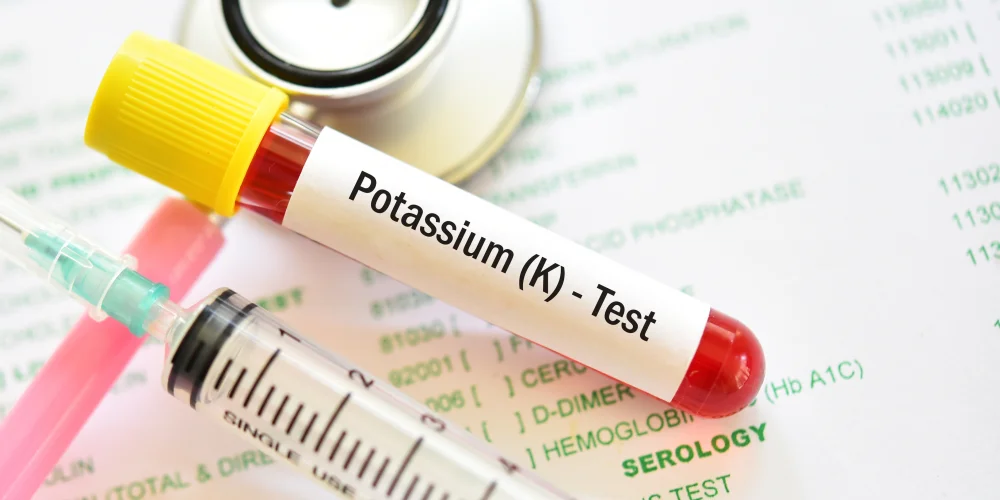Potassium Test
Assessment of Potassium Balance in the Blood
Potassium Test is a vital test that measures the potassium levels in blood. Potassium is an electrolyte that is vital to maintain good heart function as well as muscle contraction and nerve transmission. The test aids healthcare professionals to assess the potassium balance of our bodies, and is vital to overall health. A low level of potassium could indicate diverse conditions like kidney problems, dehydration or the effects of certain medications on electrolyte balance. Monitoring potassium levels can facilitate prompt intervention and treatment of these ailments to avoid complications and to ensure proper bodily functioning.

When is the Potassium Test Prescribed?
Potassium Test is prescribed in different clinical scenarios:
- Monitoring Electrolyte Balance : It assists in assessing the potassium levels to determine if they’re within the normal range.
- Diagnosis of Electrolyte Inbalances : A low potassium (hypokalemia) or high potassium (hyperkalemia) levels could suggest underlying health conditions.
- Assessment of Kidney Function : Potassium levels are carefully monitored for patients suffering from kidney disease or dialysis patients.
- Assessment of Cardiac Health : Potassium is essential for proper function of the heart Therefore, its levels are monitored in patients suffering from heart disease.
Preparation for the Potassium Test
The preparation of testing the Potassium Test typically involves no fasting as it is usually not necessary to take this test. It is nevertheless essential to inform your doctor regarding any medication or supplements you take, since certain medications can affect potassium levels and impact the interpretability of the test results. This helps ensure accurate assessment and diagnosis throughout the testing procedure for potassium.
Parameters Considered During Potassium Test
It is the Potassium Test assesses the concentration of potassium in blood, and focuses on several crucial variables. The normal potassium levels vary from 3.5 to 5.0 millimoles per Liter (mmol/L). Low levels of potassium are a sign of hypokalemia. It can be manifested as symptoms like fatigue, muscle weakness and heart rhythms that are irregular. However, elevated levels of potassium could indicate hyperkalemia. This is a life-threatening condition that can be accompanied by symptoms such as arrhythmias in the heart, muscle weakness and perhaps cardiac arrhythmias. These tests offer crucial insight into potassium balance, which allows for an accurate diagnosis and prompt medical intervention when needed.
Time Required for Potassium Test Report
It is a Potassium Test is a rapid procedure that is performed at Chirayu Super Speciality Hospital. After taking samples of blood, the results are usually ready within a couple of hours to one day, based on the lab’s processing time. This rapid turnaround time allows medical professionals to evaluate potassium levels and make quick medical decision.
Potassium Test Price
The test is offered at Chirayu Super Speciality Hospital, the Potassium Test is price is Rs300. This reasonable price ensures access to vital diagnostic tests checking the levels of potassium and general health. In keeping costs low we strive to provide the complete health care of every patient.
Book an Appointment for Potassium Test
Making an appointment for the Potassium Test at Chirayu Super Speciality Hospital in Bhayandar is designed to be easy and convenient. Our pathology lab in Bhayandar offers online booking through our user-friendly website, allowing you to choose a suitable time slot. Additionally, our knowledgeable customer service team is available to assist with appointments and any questions, ensuring a smooth and efficient experience for all diagnostic needs.
What Our Patients Say
Hear from our valued patients about their experiences at Chirayu Super Speciality Hospital and how our care has made a positive impact on their health and well-being.


Thankful for the attentive care and thorough examination during my potassium test.


Impressed by the efficiency and expertise of Chirayu Hospital's staff during my potassium test.


Highly recommend Chirayu Hospital for their dedication to accurate diagnostics.


Detailed information and compassionate care received during my potassium test appointment.


Convenient booking and minimal wait times during my potassium test visit.


Affordable pricing and excellent customer service for essential health screenings at Chirayu Hospital.
Frequently Asked Questions
Here, we provide answers to some of the most commonly asked questions to help you better understand our services, policies, and facilities. If you have any additional questions, please do not hesitate to contact us.
The test measures the concentration of potassium in the blood to assess overall potassium status.
No, fasting is not typically required for this test.
Causes include inadequate dietary intake, excessive losses (e.g., through vomiting or diarrhea), or certain medications.
Yes, high levels can be life-threatening, requiring immediate medical attention and treatment.
A blood sample is taken from a vein, usually in the arm, and analyzed in a laboratory.